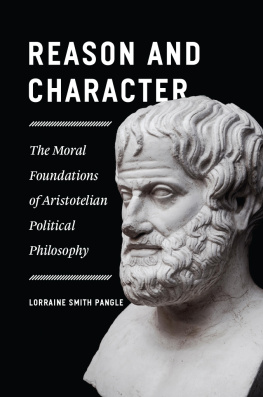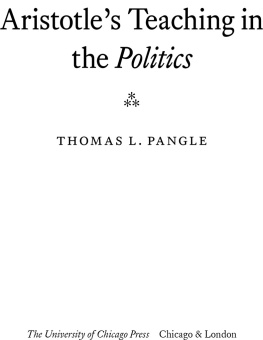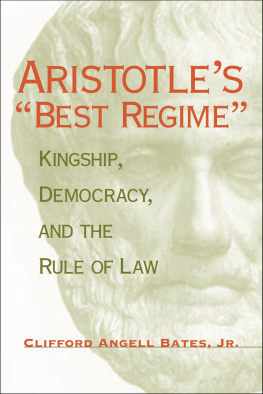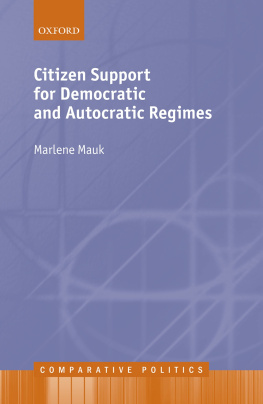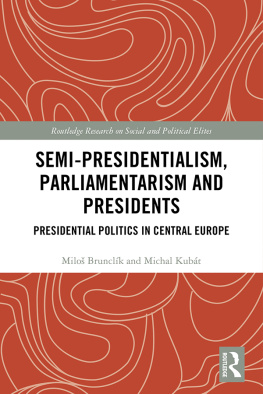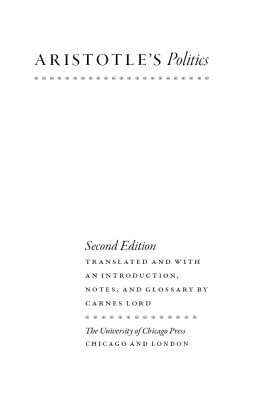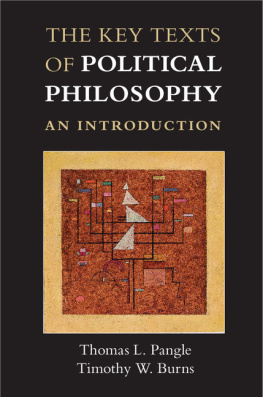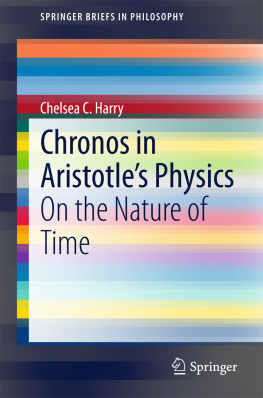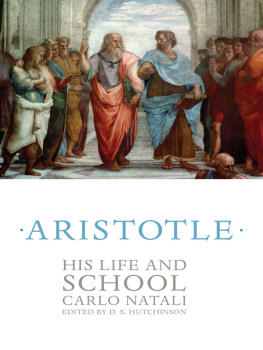Pangle - Aristotles teaching in the Politics
Here you can read online Pangle - Aristotles teaching in the Politics full text of the book (entire story) in english for free. Download pdf and epub, get meaning, cover and reviews about this ebook. City: Chicago;London, year: 2014;2013, publisher: University of Chicago Press, genre: Science. Description of the work, (preface) as well as reviews are available. Best literature library LitArk.com created for fans of good reading and offers a wide selection of genres:
Romance novel
Science fiction
Adventure
Detective
Science
History
Home and family
Prose
Art
Politics
Computer
Non-fiction
Religion
Business
Children
Humor
Choose a favorite category and find really read worthwhile books. Enjoy immersion in the world of imagination, feel the emotions of the characters or learn something new for yourself, make an fascinating discovery.

Aristotles teaching in the Politics: summary, description and annotation
We offer to read an annotation, description, summary or preface (depends on what the author of the book "Aristotles teaching in the Politics" wrote himself). If you haven't found the necessary information about the book — write in the comments, we will try to find it.
Pangle: author's other books
Who wrote Aristotles teaching in the Politics? Find out the surname, the name of the author of the book and a list of all author's works by series.
Aristotles teaching in the Politics — read online for free the complete book (whole text) full work
Below is the text of the book, divided by pages. System saving the place of the last page read, allows you to conveniently read the book "Aristotles teaching in the Politics" online for free, without having to search again every time where you left off. Put a bookmark, and you can go to the page where you finished reading at any time.
Font size:
Interval:
Bookmark:
Thomas L. Pangle is the Joe R. Long Chair in Democratic Studies in the Department of Government at the University of Texas at Austin.
He is the author or editor of numerous books, including The Theological Basis of Liberal Modernity in Montesquieus Spirit of the Laws.
The University of Chicago Press, Chicago 60637
The University of Chicago Press, Ltd., London
2013 by The University of Chicago
All rights reserved. Published 2013.
Printed in the United States of America
22 21 20 19 18 17 16 15 14 13 1 2 3 4 5
ISBN-13: 978-0-226-01603-0 (cloth)
ISBN-13: 978-0-226-01617-7 (e-book)
Library of Congress Cataloging-in-Publication Data
Pangle, Thomas L., author.
Aristotles teaching in the Politics / Thomas L. Pangle.
pages cm
Includes bibliographical references and index.
ISBN 978-0-226-01603-0 (cloth : alkaline paper)
ISBN 978-0-226-01617-7 (e-book) 1. Aristotle. Politics. 2. Political sciencePhilosophyStudy and teaching. I. Title.
JC71.A7P37 2013
320.01'1dc23
2012036971
 This paper meets the requirements of ANSI/NISO Z39.48-1992
This paper meets the requirements of ANSI/NISO Z39.48-1992
(Permanence of Paper).
Aristotles Teaching in the Politics
THOMAS L. PANGLE
The University of Chicago Press
Chicago & London
CONTENTS
INTRODUCTION
The Rhetorical Strategy Governing Aristotles Teaching
Aristotles Teaching in the Politics: this title announces, in a fuller way than at first appears, the present books distinctive approach. For teaching is meant in a twofold sense. This studys leitmotif is that the political-philosophic substance about which Aristotle seeks to educate us cannot be disentwined from the artfully educative activity in which Aristotle is engaged, and into which he seeks to draw us, throughoutan enactment which he presents as a model of how a political philosopher ought to teach, in lecturing and in writing. In other words, Aristotles public theorizing about political practice is a highly self-conscious form of political practice, of intervention in political life. We cannot learn the most important lessons the philosopher seeks to teach, about both political theory and political practice, and about the fraught relation between theory and practice, unless we maintain a constant attentiveness to the politic and exemplary manner in which he reaches out to, and enters into dialogue with, potential studentswho he knows to be of varying abilities and needs, and embedded in or contending with divergent and clashing regime-contexts. Previous modern scholarship has for the most part failed to understand the sinuously instructive path of the Politics because interpretation, with rare exceptions, has not recognized nor risen to the challenge of the philosophers psychologically subtle and multi-level, playfully serious and civically responsible mode of educative communication.
THE CHALLENGE OF INTERPRETING ARISTOTLES LECTURES
The rhetorical form that Aristotle chose to employ for his written communication, in that portion of his writings that has come down to us in nonfragmentary condition, was the lecture (akroasis), revised for publication as a treatise and yet, we learn from him that knowing much gives occasion for doubting more. One sees him often deliberately covering himself with such thick and inextricable obscurity that one cannot pick out anything of his opinion. It is in fact a Pyrrhonism under an affirmative form (cf. Robinson 1995, 70). Pascal, in his assessment of Aristotles political writings, was not so extreme. But in the course of rightly insisting that scholars tend to be blind to Aristotles (and Platos) subtly and richly comic turn, at least in their political-philosophic writings, Pascal was led to suggest that Aristotle (as well as Plato) had in the end no serious political theory: When Plato and Aristotle amused themselves by composing their Laws and Politics they did it for fun. It was the least philosophical and least serious part of their life. Indeed, it was as if to lay down rules for a madhouse. And if they pretended to speak of it as if of a great thing, it was because they knew that the madmen they were talking to believed themselves to be kings and emperors. They entered into their principles in order to moderate their madness so as to make it as little harmful as possible (Penses no. 533, in Pascal 1963).
These characterizations of Aristotles manner of writing by thinkers and writers of the first rank provide a much-needed corrective to a great deal of contemporary scholarly interpretation. Yet these appraisals are, in my judgment, (deliberately?) one-sided. Aristotle, I mean to show, has constructed his text in such a way thatif the puzzles he has placed on the surface are taken seriously and then wrestled with, in good-humored doggedness, so that we become his partners in the dialogue that Aristotle means to draw us intowe are put on a trail that leads away from skepticism. The path leads to an eventually purified knowledge of the nature of politics as shaped by the aspiration to virtue (the originary social science that was called for by Husserl 1965, 93). And that knowledge, for all its jocosity, has implications of the utmost seriousness for human existence.
The methodological digressions that Aristotle has inserted in the first few pages of his Nicomachean Ethics provide illuminating, if somewhat Delphic, clues as to the didactic nature of his lecturesand as to the multilevel audience he conceives as the intended or envisioned recipient. His first digression on method Instead, he adds that the good things also have some such variability (he does not say the good things elicit any such disagreement as do the just and noble, nor that the good things seem to exist only by convention and not by nature). The variability in the good things that he has in mind he specifies as follows: Harms to many people result from the good things: for some have been destroyed on account of wealth, and others on account of courage. Therefore, two things are very desirable. First, in speaking about such things and on the basis of such things, to show the truth [only] roughly and in outline (the exact truth, as a good thingthe exact truth about the just and the noble, perhaps especially the exact truth that emerges from an investigation into the great disagreement the just and noble containmay be harmful to some or to many). Second, in speaking about things that apply only mostly, and on the basis of such things, to draw conclusions of that [same] sort. The philosopher goes on to indicate that in speaking thus he will offer something closer to the persuasive speech one accepts from an artful rhetorician than to the demonstrations one requires from a mathematician: such a very imperfect degree of precision is what the peculiar nature of the business [pragma] displays. In a subsequent explicit repetition (NE 1098a2631), the philosopher characterizes his writing on morals by comparing it to what is of moment to a carpenter, in contrast with a mathematician: both seek what is right [orthen], but the former to the extent useful for the task, while the latter seeks what it is; or what sort of thing it isbecause he is a contemplator of the truth. Aristotle thus prods us to see that in his moral and political writings his concern to be a contemplator of the truth must be considerably alloyed by practical concerns.
The other major point that Aristotle makes in his first methodological digression is an admonition (which is not without its comic aspect) concerning the audience whom he has in view first and foremost. He in effect sets the scene in which we must imagine the succeeding lectures taking place. A young man, he declares, does not belong in this audience. Young men should leave, or should read no further. The proper audience comprises those among their elders who will judge nobly becauseunlike some of their peers, as well as the youngthey have the kind of unscientific knowledge (
Next pageFont size:
Interval:
Bookmark:
Similar books «Aristotles teaching in the Politics»
Look at similar books to Aristotles teaching in the Politics. We have selected literature similar in name and meaning in the hope of providing readers with more options to find new, interesting, not yet read works.
Discussion, reviews of the book Aristotles teaching in the Politics and just readers' own opinions. Leave your comments, write what you think about the work, its meaning or the main characters. Specify what exactly you liked and what you didn't like, and why you think so.


